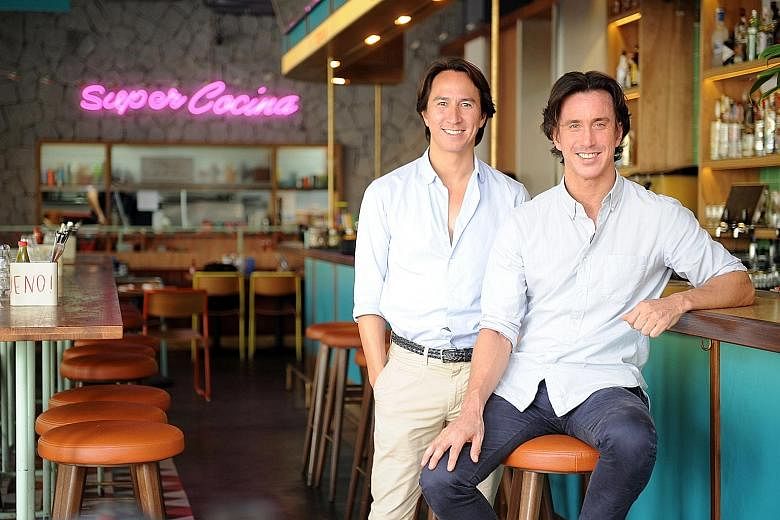Q: How did you come to set up your businesses?
Julian: I was an investment banker for 12 years, while Christian was working in Sydney doing marketing and project management for a global IT company.
I was friends with the people behind The Lo & Behold Group, and they invited me to partner them and set up Loof. Loof did very well and opened our eyes to food and beverage (F&B) and the opportunities in Singapore. For many years, we were looking for opportunities, concepts and sites. We were travelling the world looking at ideas while we were still doing our corporate jobs.
We came across the site Tanjong Beach Club in Sentosa and as it was quite a big project, we needed a partner. I asked The Lo & Behold Group if they wanted to do a joint venture and we won the site. It was quite a competitive tender process, with 12 parties bidding for it.
We then quit our jobs and started doing F&B full time.
We set up Lucha Loco three years ago - just Christian, myself and another friend - and set up Super Loco a year ago. Now, we are planning to expand with two new Mexican restaurants next year - one in Singapore and the other in Jakarta.
Christian: We like to create places that we like to go to. Regarding the beach club, we are surfers and grew up on the beach in Perth, Australia. We love casual concepts and like fun, festive venues. That was the motivation behind creating Tanjong Beach Club and the casual Mexican concepts.
Q: What was it like making the transition to full-time F&B?
Christian: As students, we worked a lot in F&B, but we have never been owners. It was a great learning experience and Tanjong Beach Club was a huge project to take on. It's a massive venue - we get up to a 1,000 people on a busy Sunday.
The transition was good, we were focused just on making this an amazing location.
Julian: It was a big financial investment - the total project cost $4 million. From that perspective, we put in everything and it had to work.
It was quite a steep learning curve. We were just trying to learn and absorb everything we could.
Q: How were you involved in Tanjong Beach Club?
Christian: A lot of it was customer-oriented. I managed a lot of corporate events and oversaw some of the larger parties we had. We promoted the venue and oversaw the operations with The Lo & Behold Group. We made sure the food and drink quality was always good and up to standard. We also made sure we were present at the venue, welcoming and greeting people.
Q: What is difficult about running an F&B business, especially for a newcomer?
Julian: The fact that you're not working in a corporate environment, where processes are established. When setting up a business, you have to set up the processes and put everything in place and it can take a long time to do that. Sometimes, you have to wait till problems happen before you know what you need to put in place.
Christian: It's not a 9-to-5 job, where you can switch off after 5pm. We're constantly thinking about how we can improve our business.
In F&B... you're only as good as your last customer experience.
Another challenge is the labour - there's a small pool of labour in Singapore and everybody is pulling for that small pool. We are a big venue with many people who come on weekends, so we need a lot of staff.
Q: To set up the processes, was there any point of reference you had or any way to see how you could go about doing things?
Julian: For the Mexican restaurants, we did everything from scratch. Managers who came to work for us had some knowledge and experience, which was useful, but we developed everything in-house.
Because of our background, we may have taken a slightly different approach than other F&B operators. I think they become very set in their way of doing things. We came in with quite a fresh approach. Especially when it came to staff remuneration - we structured a scheme which is quite different - as well as our involvement in the business. We are very hands on.
I think those are quite different from many owners. An owner might set it up, put in a manager, pop in every now again. But since we opened, we've been at any one of our eateries every single night.
Christian: We also do the tasks, such as clearing tables and greeting guests. We analyse these roles and look at ways of improving them.
Julian: We believe we will know how to make things better only if we experience it ourselves. So most of our meals are eaten at the restaurants and we get involved in the service, working alongside the team and building a family environment.
Q: How did you go from Tanjong Beach Club, a joint venture, to striking it out on your own?
Christian: We still saw a lot of opportunities in the middle market space. A big driver was when we used to go out, we would struggle to think of where to go - we wanted a place that's vibrant, where the music is a bit louder, and is fun and casual. That signalled to us there was an opportunity there.
Julian: We are very passionate about Mexican food and felt there wasn't a Mexican offering in Singapore we thought was really good.
Christian: We draw a lot of inspiration from our travels to Mexico and around the world.
Q: How are your restaurants doing and how have they grown over time?
Julian: Tanjong Beach Club has 2,000 or more guests a week if the weather is good. Lucha Loco and Super Loco turn over about 1,500 people weekly each.
Before, we would go out and look for locations and landlords could be sceptical about a Mexican restaurant. Now, landlords are coming to us - they see our venues as bringing more energy to areas that are potentially not so busy.
Q: What do you look for in a location?
Julian: We want a certain size. We like an al fresco component, accessibility.
Christian: We like it when the building has a bit of character. For our Mexican concepts, it doesn't hurt when it's a bit distressed and we are able to replicate the rawness we saw on Mexico's streets.
Lucha Loco is a good example. We were peeling back the walls and taking off the old paint of the old venue and we came across these fantastic colours. We told the workers to stop and leave it as it is... We were told it was a temple before, so it had some gold paint underneath.
Q: What different roles do you play for your restaurants?
Julian: Given what we used to do in our corporate jobs, we stick to what our skills are.
I'm the finance guy - I look after finance, business planning and strategic development or business development. I do a lot of financial modelling and forecast all the restaurants' profitability before we open.
I oversee the accounting, reporting, licensing and project management when it comes to setting up the restaurants.
Christian: I handle the marketing, customer experience, branding and aesthetics of our restaurants.
We have another partner, who focuses on the operations, human resources and technology aspects.
We are a good team. We have clear roles and there's a bit of overlap but we give one another space.
Julian: We recently brought in a new partner, Mr Jason Jones. He's a celebrity chef from Australia who moved here and oversees the culinary part of the business. He founded a successful Mexican restaurant in Melbourne called Mamasita.
Q: What do you like about F&B and what drives you in this line?
Julian: Seeing our guests happy and having a great time, enjoying the food, drinks and atmosphere.
Christian: Definitely. And the whole journey has been fantastic - in terms of drawing inspiration from Mexico, sitting down with designers and consultants finding an amazing space in Duxton Hill (Lucha Loco) and Robertson Quay (Super Loco).
Putting all those ideas down and seeing it come together, walking into a restaurant where we have 200 customers enjoying themselves - it is extremely satisfying.
Q: What is it like being in business with family?
Julian: It is great, our dynamic is really good. We have different skill sets, so we don't really overlap in each others' areas. We help, support and give each other ideas, but we have really delineated responsibilities. We disagree at times on things but we always have a healthy discussion, and I think it always leads to be a better outcome. In a way, we don't hold back as we are family, so if we don't agree with something we will tell each other.
But, generally, we are on the same page, we have the same taste and style, so we are quite well aligned.
You have that family bond as well. It's not like a partnership that you can break up and go your own ways. You have that additional bond.


